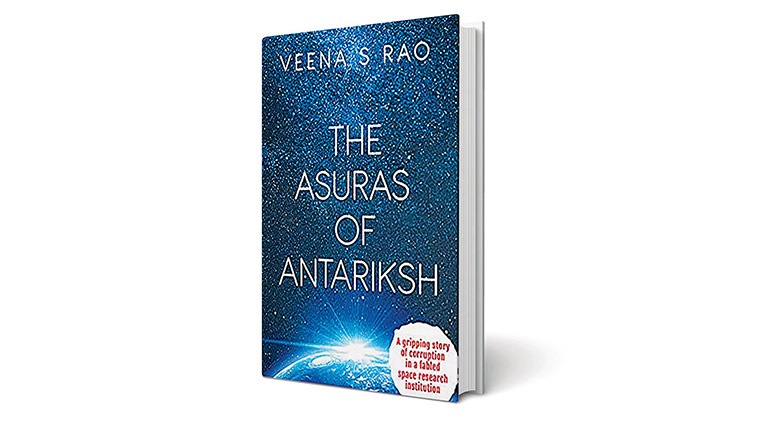
The Asuras of Antariksh
Veena Rao
Vitasta Publishing Pvt. Ltd
311 pages
Rs 395
The author wants you to believe that this is a work of fiction. And fiction, indeed, it is. But if you happen to be even vaguely aware of the Antrix-Devas case, you would be engulfed with a sense of déjà vu from the very beginning.
The book tells the story of a corrupt deal signed by the ‘Indian Space Agency’, or ISA as it is called in the novel, with the US-based ‘Oriont Telecom’ to start new services in the mobile telephony market in India, and the political controversy and scandal that it develops into. Sounds too familiar? Well, there is absolutely no effort to disguise the inspiration of the plot. In fact, the first few pages seem to encourage the reader to believe that this is a behind-the-scenes account of the real thing. Especially once you realise that author Veena Rao, a retired IAS officer, had served as financial advisor in the Indian Space Research Organisation (ISRO), and watched the deal being finalised from close quarters. In fact, she is among the officials implicated in an ongoing investigation into the now-cancelled deal.
Many of the key characters in the story closely resemble real-life players in the Devas saga, and some of the incidents described are drawn directly from the real drama. And yet, Rao’s book is not a fictionalised account of the Devas scandal, nor an attempt to narrate her version of events. As the story progresses, it takes on a life of its own, and unfolds very differently. It certainly arrives at a very different ending.
ALSO READ | The Ground Beneath Her Feet
Though the story plays out in the fictional ISA, the reader is left in no doubt about the intention to describe the goings-on within India’s space establishment. The author paints a very irreverent picture, with politics, intrigue, manipulation and forgery and, of course, corruption. Venerable scientists look like small, petty men (they are mostly men) scheming to gain power and money, and finally trying every dirty trick to save their skins. The description is at odds with the public image of ISRO as an organisation with simple, hard-working scientists who are making their country proud with their outstanding success in space. But for those familiar with the Devas saga, it rings true.
The Antrix-Devas scandal became public in 2011, when the controversy over the 2G spectrum scam was still making headlines. Through its marketing arm Antrix Corporation, ISRO had entered into an agreement in 2004 with Devas Multimedia, an Indian subsidiary of a US-based company, to start satellite-based mobile data services. At the time, mobile phones were only being used for telephony and text messages, and internet and data services had not appeared on the horizon. As part of the deal, ISRO had promised to build two satellites for almost exclusive use of Devas, in lieu of an annual fee. ISRO had also offered 70 MHz of S-band microwave spectrum, nearly half of what it owned, to Devas to beam its services. Devas had promised to bring on board proprietary technology to start satellite-based data services on mobile devices.
Several irregularities were reported in the deal, including allegations that ISRO had hidden key information from the government to favour Devas, and that it had overlooked expert advice questioning Devas’ technology. The deal was eventually cancelled, with the government claiming that the S-band spectrum was needed for defence and strategic purposes, and at least three inquiries were instituted, all of which pointed to procedural violations. Former ISRO chairman G Madhavan Nair, who had been honoured with a Padma Vibhushan just two years earlier, was blacklisted by the government, along with four senior ISRO officials. Both Nair and his successor K Radhakrishnan are facing a CBI investigation instituted later.
The Devas scandal is, without doubt, the darkest chapter in ISRO’s history. The financial implications of the deal are still being assessed, since the damages that have been awarded to Devas for unilateral cancellation have not yet been settled. The criminal investigation is also being pursued. But the case has largely disappeared from public memory. Rao’s novel reopens old wounds. Her depiction of events may not always be true to life, but is clearly an indication of the manner in which the space establishment and other government departments function. Her work comes close on the heels of another book that gave some irreverent accounts of ISRO’s top leadership — former ISRO scientist S Nambi Narayanan’s Ready to Fire (Bloomsbury, 2018), which presented a first-hand account of the fabricated spy case in which he was embroiled, and which finished his career.